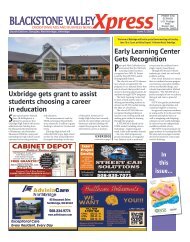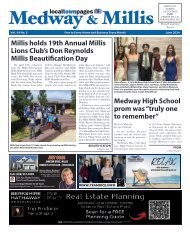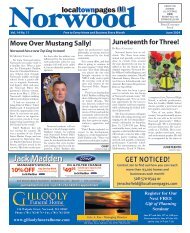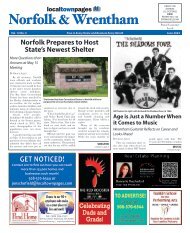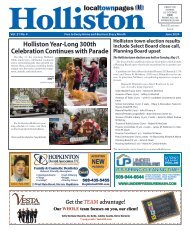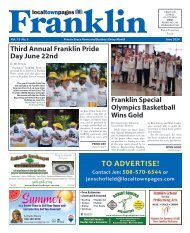Ashland June 2016
<style>.embed-container { position: relative; padding-bottom: 56.25%; height: 0; overflow: hidden; max-width: 100%; } .embed-container iframe, .embed-container object, .embed-container embed { position: absolute; top: 0; left: 0; width: 100%; height: 100%; }</style><div class='embed-container'><iframe src="https://www.yumpu.com/en/embed/view/X7afUNILGY5AFpc9" frameborder="0" allowfullscreen="true" allowtransparency="true"></iframe></div>
<style>.embed-container { position: relative; padding-bottom: 56.25%; height: 0; overflow: hidden; max-width: 100%; } .embed-container iframe, .embed-container object, .embed-container embed { position: absolute; top: 0; left: 0; width: 100%; height: 100%; }</style><div class='embed-container'><iframe src="https://www.yumpu.com/en/embed/view/X7afUNILGY5AFpc9" frameborder="0" allowfullscreen="true" allowtransparency="true"></iframe></div>
You also want an ePaper? Increase the reach of your titles
YUMPU automatically turns print PDFs into web optimized ePapers that Google loves.
Page 20 Local Town Pages www.ashlandtownnews.com <strong>June</strong> <strong>2016</strong><br />
<strong>Ashland</strong> Travels<br />
An Unofficial Guided Tour of Noriega’s Estate<br />
The estate had been a self-sufficient fortress<br />
with an escape tunnel.<br />
By Howard Axelrod,<br />
Contributing Writer<br />
During the period from 1983<br />
to 1989, Manuel Noriega was one<br />
of the wealthiest and most powerful<br />
dictators, arms dealers and<br />
drug lords in the world. After US<br />
forces invaded Panama in 1989,<br />
extradited, prosecuted and jailed<br />
him, he is now wasting away, at<br />
the age of 81, in a federal prison<br />
in Panama.<br />
This guy was no Boy Scout.<br />
The US jury tried Noriega on<br />
eight counts of racketeering, conspiracy,<br />
and cocaine smuggling.<br />
He was sentenced to 40 years in<br />
prison (later reduced to 30). Twice<br />
turned down for parole, he was<br />
released from prison in 2007.<br />
France subsequently extradited<br />
and convicted him of murder and<br />
money laundering, sentencing<br />
him to a seven-year prison term.<br />
A conditional release was granted<br />
on Sept. 23, 2011 for Noriega to<br />
be extradited once again, this time<br />
to serve 20 years in prison in his<br />
native Panama. He returned to<br />
Panama on December 11, 2011.<br />
He will most likely spend the rest<br />
of his life here behind bars.<br />
Private Guided Tour<br />
In 2002 my wife Nancy and I<br />
took a private guided tour of Panama.<br />
While in Panama City our<br />
guide and driver Mario stopped<br />
our vehicle to show us the exterior<br />
of the Noriega Estate, which is no<br />
longer occupied, and is off limits<br />
to the public. Our driver began<br />
chatting with the rather large and<br />
scary-looking military guard on<br />
duty. The guard looked ‘right out<br />
of central casting,’ complete with<br />
facial scars. As it turned out, our<br />
driver had once worked in the<br />
Noriega regime as an aerial photographer.<br />
As such, the guard on<br />
duty apparently felt some bond of<br />
trust and comradeship with him.<br />
Sensing a way to make a few quick<br />
US greenbacks, the guard—after<br />
looking around carefully—asked<br />
us if we would like to see the inside<br />
of the estate and grounds.<br />
Now clearly, this is not ‘legit,’ and<br />
we all knew it. Mario, a licensed,<br />
professional guide of 17 years, said<br />
that such an invitation is absolutely<br />
unimaginable.<br />
The next thing we knew, the estate<br />
guard, a former officer under<br />
The ceramic tile nameplate on the<br />
front gate of the estate/fortress.<br />
the Noriega regime in the 80s,<br />
ushered us inside, padlocking the<br />
iron gate behind us. I remember<br />
thinking that the closing gate had<br />
a sound similar to that of a jail<br />
cell swinging shut. He then proceeded<br />
to give us a private guided<br />
tour of the estate. We exchanged<br />
pleasantries as best as possible. He<br />
spoke little English, and we spoke<br />
little Spanish. I flattered him by<br />
complementing him on all of<br />
the colorful medals and patches,<br />
which he displayed proudly on<br />
his military uniform. My wife followed<br />
my cue and did the same.<br />
He re-payed us with a smile.<br />
Have you ever had the feeling<br />
you were in a place you simply<br />
did not belong? The feeling was<br />
palpable and pervasive. My wife<br />
and I were tense, and felt that at<br />
any moment we would be apprehended<br />
and swept off to a Panamanian<br />
jail cell. Clearly we did not<br />
belong here! This was not a tourist<br />
attraction, and the military guard<br />
was certainly not stationed there to<br />
give private tours. Gradually, we<br />
relaxed a bit and we began to take<br />
in everything around us. I asked if<br />
taking photographs was OK, and<br />
to my amazement the guard said<br />
yes.<br />
The Noriega estate is in disrepair,<br />
as it had not had any maintenance<br />
in over a decade. A thick<br />
layer of dust covered the interior.<br />
Boards are falling off the side of<br />
the house, wooden decking is<br />
rotting, and many wooden stairs<br />
were broken. Clearly, this was not<br />
a place designed for the public to<br />
visit.<br />
Floor-by-Floor Tour<br />
On the first floor we toured<br />
Noriega’s private movie theater,<br />
barbecue area and bar. Some<br />
wine bottles, covered with dust,<br />
were still in the rack. We examined<br />
these, and it was clear that the<br />
dictator had a taste for fine French<br />
Grand Crus.<br />
On the second floor we found<br />
The fountains in front of the main house have been turned off for over<br />
a decade.<br />
Noriega’s private beauty salon, including his suitcases and suits.<br />
The personal desk of General Noriega.<br />
ourselves in Noriega’s office and<br />
study. Almost every item was<br />
marked with an inventory tag.<br />
There had once been an undertaking<br />
to turn the estate and<br />
grounds into a museum, and as<br />
such everything had been inventoried<br />
and tagged. The museum<br />
never materialized. We saw<br />
Noriega’s desk and chair, and the<br />
guard even pulled out the former<br />
dictator’s scrapbook, complete<br />
with mementos and photos from<br />
his daughter’s wedding! As we<br />
(Photos/Howard Axelrod)<br />
looked through this scrapbook, I<br />
kept thinking, “Should we really<br />
be looking at this? Is this ethically<br />
and morally right? Were we invading<br />
another person’s privacy?<br />
Does it really matter that he was<br />
a convicted, international criminal<br />
and had not been here in over a<br />
decade?”<br />
I felt conflicted but was afraid to<br />
offend the guard. It was unbelievable<br />
to be looking at the personal<br />
belongings in the private office<br />
and on the personal desk, where<br />
one of the wealthiest and most<br />
powerful dictators and criminals<br />
in the world once sat. The guard<br />
invited me to sit in the General’s<br />
desk chair, and shivers ran up my<br />
spine. I graciously declined. I felt<br />
that sitting in this chair was somehow<br />
going too far. Opening and<br />
closing drawers and cabinets, our<br />
host showed us many of Noriega’s<br />
personal possessions.<br />
During the time in his office,<br />
we felt like grave robbers, at times<br />
almost expecting to be caught. I<br />
snapped photos inside using flash,<br />
as the only light was that which<br />
entered through windows covered<br />
with a thick layer of dust. The<br />
electricity and water service had<br />
been disconnected long ago.<br />
The guard then reached into a<br />
dusty bookcase, and pulled down<br />
a paperback copy of a book that<br />
had been written by Felicidad Sieiro<br />
de Noriega, the General’s wife,<br />
an educated woman, and a professor<br />
at the University of Panama at<br />
the time of publication (1968). Los<br />
Indio’s Guaymies – Frente al problema<br />
educativo y cultural was a study of the<br />
Guaymie Indians, one of Panama’s<br />
indigenous tribes. The pages<br />
of the book had yellowed with<br />
age. Some 20 or so identical copies<br />
were in the bookcase, all covered<br />
in dust. Apparently the ex-dictator<br />
would present these as gifts to his<br />
guests. He was proud of his educated<br />
and accomplished wife. The<br />
guard handed my wife Nancy the<br />
book and said, “I have something<br />
for you, if you have something for<br />
me . . . .” We got the me$$age, and<br />
became the owner of this item.<br />
On the left of the General’s<br />
desk was a table where some 50<br />
or so empty opened jewelry and<br />
wrist watch boxes laid. Apparently<br />
Noriega would keep very<br />
expensive watches and jewelry on<br />
hand to give as gifts to guests. The<br />
rumor is that after Noriega had<br />
been forcibly removed from the<br />
estate by US troops, some 5 million<br />
dollars in jewelry and watches<br />
somehow ‘walked out the door.’<br />
Additional rumors are that in<br />
the storage areas of the mansion,<br />
many 40-gallon drums had been<br />
found, filled with money. I doubt<br />
we are talking “ones” here!<br />
A Self-Sufficient Fortress<br />
We were then led by flashlight<br />
to a basement room where old<br />
electric generators and fresh water<br />
NORIEGA’S ESTATE<br />
continued on page 21





